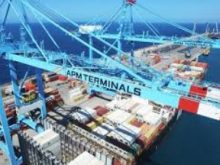 APM Terminals Pipavav has announced that the port has reduced terminal handling charges for empty containers by a quarter to help the exporters, facing container shortage for overseas shipments. The charges have been revised downward from November 16 and will remain in effect till December 31, 2020. The move is aimed at supporting exporters in getting easy access to empty containers and reducing the waiting period. APM Terminals Pipavav is taking efforts to facilitate trade and help in reviving the economy amid a considerable imbalance in trade due to severe shortage of containers for exporters.
APM Terminals Pipavav has announced that the port has reduced terminal handling charges for empty containers by a quarter to help the exporters, facing container shortage for overseas shipments. The charges have been revised downward from November 16 and will remain in effect till December 31, 2020. The move is aimed at supporting exporters in getting easy access to empty containers and reducing the waiting period. APM Terminals Pipavav is taking efforts to facilitate trade and help in reviving the economy amid a considerable imbalance in trade due to severe shortage of containers for exporters.
“The Port has reduced the terminal handling charges for empty containers by 25 per cent to enable the exporters who are adversely impacted by the shortage of empty containers due to significant fall in imports,” APM Pipavav Terminals said.
The reduction for handling charges on the tariff is effective for vessels sailing from November 16 to December 31. “Looking at the trade cycle adversely affected by the shortage of containers, we decided to assist the trade through a reduction in handling charges of empty containers. I hope this will support exporters in getting easy access to empty containers and reduce the waiting period, thereby addressing the critical issue of container shortage,” said Jakob Friis Sorensen, Managing Director, APM Terminals Pipavav.
India’s exports during April-October period of the current financial year fell 19 per cent to US$ 150.14 billion, while imports declined 36.3 per cent to US$ 182.29 billion, citing data from the Ministry of Commerce and Industry. The country is facing a shortage of containers for exports as the containers that come in as imports are shipped out for exports, APM Pipavav Terminals said, adding that because of a significant fall in imports, shipping companies had cut capacity that impacted the availability of allied transportation systems like trucks and containers. This resulted in a shortage of empty containers hurting exporters as access to a container is now taking more than two-three weeks compared to a maximum of 4-5 days earlier, it said.
“With improvement seen in domestic trade, we believe the international trade too shall pick up from the first quarter of next calendar year, thereby decongesting traffic at port and improving the overall trade sentiment,” Sorensen said.
 Cargo Breaking News
Cargo Breaking News


